The Lost Moment Blu-ray Movie
HomeThe Lost Moment Blu-ray Movie 
Olive Films | 1947 | 89 min | Not rated | Jul 08, 2014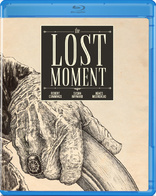
Price
List price:Amazon: $21.13 (Save 29%)
Third party: $21.13 (Save 29%)
Only 1 left in stock (more on the way).
Movie rating
7 | / 10 |
Blu-ray rating
| Users | 0.0 | |
| Reviewer | 3.5 | |
| Overall | 3.5 |
Overview
The Lost Moment (1947)
An art publisher insinuates himself into the mouldering mansion of the centenarian lover of a renowned but long-dead poet in order to find his lost love letters.
Starring: Robert Cummings, Susan Hayward, Agnes Moorehead, Joan Lorring, Eduardo CiannelliDirector: Martin Gabel
| Drama | Uncertain |
| Romance | Uncertain |
Specifications
Video
Video codec: MPEG-4 AVC
Video resolution: 1080p
Aspect ratio: 1.37:1
Original aspect ratio: 1.37:1
Audio
English: DTS-HD Master Audio Mono (48kHz, 16-bit)
Subtitles
None
Discs
25GB Blu-ray Disc
Single disc (1 BD)
Playback
Region A (B, C untested)
Review
Rating summary
| Movie | 3.5 | |
| Video | 3.5 | |
| Audio | 3.5 | |
| Extras | 0.0 | |
| Overall | 3.5 |
The Lost Moment Blu-ray Movie Review
This heiress isn't so innocent.
Reviewed by Jeffrey Kauffman July 3, 2014Baby Boomers who harbor nostalgic memories of cozying up in the fluorescent glow of their families’ black and white televisions in the sixties on Sunday nights to catch the CBS schedule may have some dim vestiges of one Martin Gabel residing somewhere in the darkest recesses of their synapses. While Gabel had at least a notable if not especially illustrious acting career (including a stint with Orson Welles’ Mercury Theater), for Boomers he was best known for being “Mr. Arlene Francis”, the spouse of the popular panelist on CBS’ long running nighttime game show What’s My Line? Francis was another celebrity whom Boomers just kind of accepted for being some kind of star due to her ubiquitous television presence, though few in that generation (or indeed even older ones) probably knew much about her pre-game show career. But the situation was probably even more marked with Gabel, a small, bookish man with huge horned rim glasses who would occasionally show up beside his wife on What’s My Line? to guess various contestants’ unusual occupations. Gabel’s film career wasn’t especially illustrious, though he managed to score a couple of memorable supporting bits in films as disparate as Deadline U.S.A. and Marnie. In 1947 Gabel was still probably best known for his radio work, but he segued into the film business in two different capacities on films linked by appearances by Susan Hayward and the production imprimatur of Walter Wanger. Gabel served as Associate Producer on Smash Up: The Story of a Woman, a film which garnered Hayward an Academy Award nomination as a singer undergoing psychological problems, a role purportedly based on the life of Bing Crosby’s first wife, but which has certain parallels with a then more recent headline making story, the precipitous decline and institutionalization of Frances Farmer, an actress with whom Hayward herself had worked on the 1941 proto-noir Among the Living. Perhaps a bit more surprisingly, Gabel served as director (his only time in this particular capacity) of The Lost Moment, a kind of Rebecca-esque Gothic psychological thriller with Hayward in a decidedly Mrs. Danvers like role (at least some of the time—more about that in a moment). The Lost Moment was based on a Henry James novella called The Aspern Papers, a kind of suspense ridden romance that itself was based on a long ago romance between Percy Bysshe Shelley and his wife's stepsister Claire Clairmont.
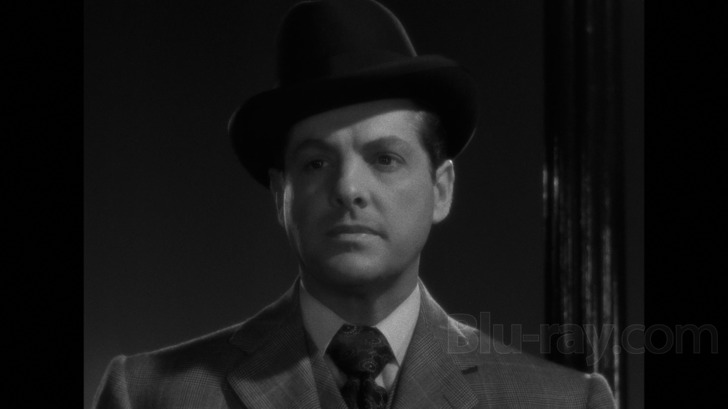
Henry James’ works have had a rather spotty track record in their migration to the medium of film. James’ frequently used plot device of the clash of cultures (typically European and American) is something rather easy to portray on screen, but his interior monologues and psychological dispositions (something he shared with his famous philosopher brother, William) present built in obstacles to even the most skilled scenarist. Some, like The Innocents’ William Archibald and Truman Capote or The Heiress' Ruth and Augustus Goetz, beautifully utilized ambivalence to depict the roiling inner worlds of various characters. Other, somewhat less felicitous adapters, like Frederic Raphael’s version of Daisy Miller, leave it to the audience to infer an interior world based on the sometimes inscrutable outward appearance and performance of the actors. The Lost Moment, which ultimately introduces several non-Jamesian elements into the story, tends to walk a sort of middle ground. It’s neither as complex nor ultimately as satisfying as The Innocents, despite trafficking in somewhat the same “is that character crazy or not?” idiom, but it does provide a somewhat more vibrant inner life for several characters that screenwriter Leonardo Bercovici allows to find voice via some florid monologues or in the case of Robert Cummings, narration and voiceover.
The main plot of The Lost Moment deals with publisher Lewis Venable (Robert Cummings), a noble sort who is determined to find and publish some supposedly lost love letters a famous American poet named Jeffrey Ashton (Aspern in James’ original, hence the title of the novella) wrote to his long ago love Juliana Bordereau. Against considerable odds, Lewis has discovered that Juliana is still alive at the age of 105 and is living in a Gothic villa in Venice. Lewis adopts a nom de plume (literally, pretending to be an author), and arranges to rent rooms at the Borderau mansion, ostensibly so that he has a secluded place in which to write. His real goal is to make contact with Juliana and see if the letters are still extant. When Lewis shows up at the foreboding Bordereau estate, he’s met by the imperious and curt Tina Bordereau (Susan Hayward), a woman who could give Mrs. Danvers a run for her uptight martinet money. Tina is not at all happy Lewis is there and is in fact convinced he has some ulterior motive, which of course he does.
Things become somewhat more complex when Lewis is finally introduced to the aged Juliana (a completely unrecognizable Agnes Moorehead, buried under what must be pounds of latex). Juliana hints at some schism between her and Tina, and later, when Lewis is asked to sign an agreement by Tina, Lewis is shocked to see Tina sign both her great-Aunt’s name and her own with completely different signatures. One night Lewis hears magnificent piano playing somewhere in the expansive mansion, and ultimately finds Tina, her hair now flowing down about her shoulders and with a completely different persona, pounding away at the keys. It seems that Tina suffers from a sort of split personality and at times believes she’s the young Juliana being courted by Jeffrey Ashton. When Lewis walks in on her, Tina’s illness makes her believe Lewis is Ashton.
From these odd building blocks, The Lost Moment weaves a rather hypnotic spell, though the film relies on a too rote romantic plot device once Lewis and Tina become better acquainted. There’s also a fitfully developed subplot of what ever became of Ashton, since he supposedly disappeared under mysterious circumstances and Lewis comes to believe he’s buried on the Bordereau property. The film is hemmed in by contrivances of its era and would have been more effective had Tina’s schizophrenic qualities been allowed to really “flower”, so to speak. Despite a too pat resolution to this aspect of the story, Hayward is rather amazing in this unusual “dual” performance, nicely evincing both the harridan and vulnerable qualities of Tina. Cummings is his typically bland presence, though it must be stated he moves with a certain catlike grace in a couple of interesting sequences where he has to tool around the immense mansion. Moorehead gives a wonderfully outré performance that is almost entirely vocal—the framings of Juliana prevent any really good, lasting look at her face (perhaps due to the limitations of the makeup).
For a first (and only) time director, Gabel elicits generally fine performances here and utilizes the camera extremely well, part of which could very well be attributed to his ace cinematographer, the iconic Hal Mohr, the only DP in Hollywood history to win an Oscar on a write in vote (the Academy later changed its rules to prevent a repeat of this feat), and the first cinematographer to win for both black and white and color films. The camera here is surprisingly supple, with several great tracking and dolly shots that make the Bordereau house become almost another character. While there’s no real definition of time (if Ashton died in 1843 and Juliana is now 105 it would seem to be either the late 19th or early 20th century) and the supposed location of Venice isn’t even exploited very much, there’s a palpable mood overhanging and suffusing this picture that makes it a surprisingly effective piece. It may not have the nuance of the best James adaptations, but it manages to create a very distinctive ambience that combines elements of romance, Gothic suspense and even a few musings about the permanence of Art.
The Lost Moment Blu-ray Movie, Video Quality 
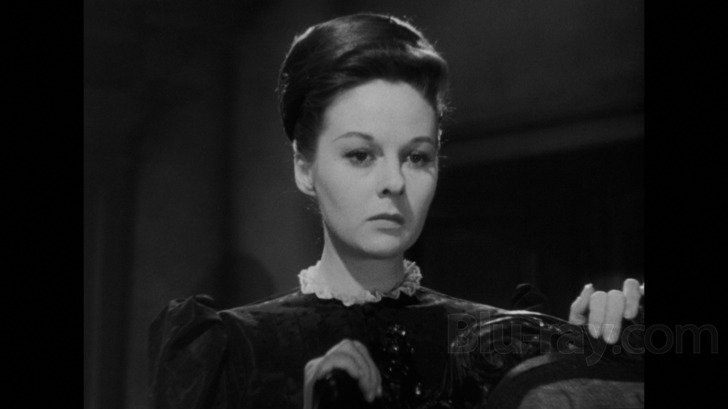
The Lost Moment is presented on Blu-ray courtesy of Olive Films with an AVC encoded 1080p transfer in 1.37:1. While this isn't quite at the level of the best black and white releases of this vintage we've seen from Olive, on the whole it offers a more than satisfying viewing experience. The elements have their requisite share of age related issues, including a few rather bad scratches and a couple of emulsion problems (typically on the right side of the frame). Contrast is also just slightly variable at times, though generally speaking is nicely crisp. Clarity is also somewhat variable, with some midrange and close-ups looking really good (including with well above average fine detail), but at other times being noticeably softer. As with virtually all Olive releases of catalog titles, there appears to have been no major restorative work done nor any digital manipulation of the image.
The Lost Moment Blu-ray Movie, Audio Quality 
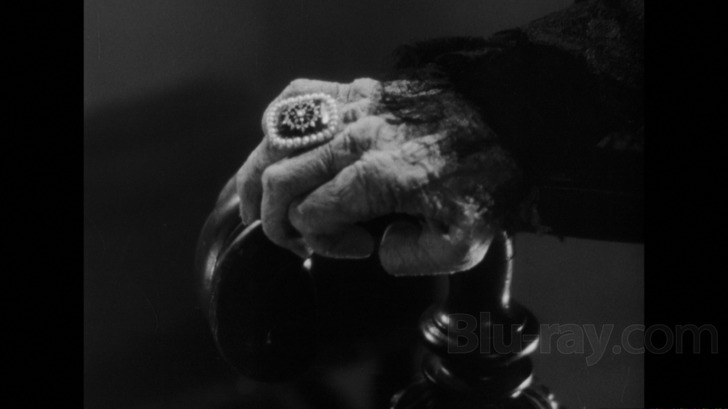
While The Lost Moment's lossless DTS-HD Master Audio Mono mix is a bit on the shallow side, it offers a rather nicely detailed accounting of the film's dialogue and (especially) the extremely effective score by Russian born Daniele Amfitheatrof. Amfitheatrof utilizes a lot of spooky sounding choral cues which add inimitably to the film's moody ambience, and those cues sound surprisingly spry here. Aside from a somewhat clipped high end and minimal hiss, there's really nothing here to worry about.
The Lost Moment Blu-ray Movie, Special Features and Extras 
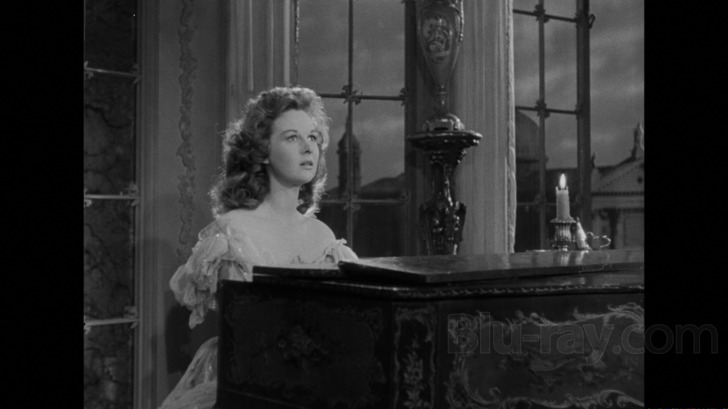
There are no supplements offered on this Blu-ray disc, per Olive's usual practice.
The Lost Moment Blu-ray Movie, Overall Score and Recommendation 
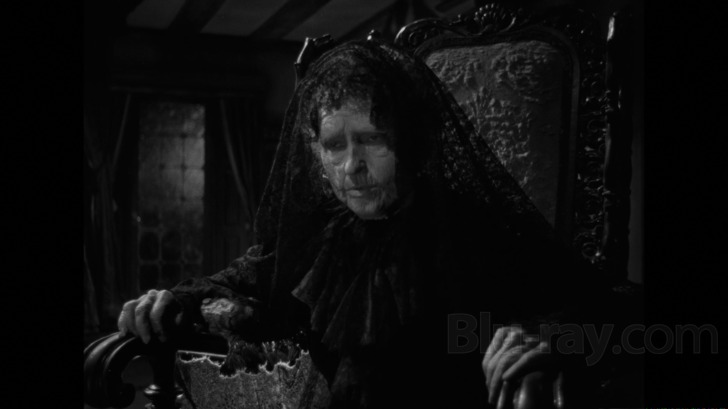
The Lost Moment may ultimately only have a tangential relationship to its Henry James source material, but it turns out to be a rather effective piece that certainly offers a great chance for Hayward to strut her talents as a sort of quasi-dual character. The production design is also very evocative, making the expansive Bordereau mansion a real character in the film. If Cummings is his typically bland self, the supporting cast is very colorful, and The Lost Moment deserves to be found by a new generation of film fan. Recommended.
Similar titles
Similar titles you might also like

Marty
4K Restoration
1955

My Cousin Rachel
Limited Edition to 3000
1952

The Strange Love of Martha Ivers
4K Restoration
1946

Dr. Jekyll and Mr. Hyde
Warner Archive Collection
1941

The Dark Mirror
1946

The Three Faces of Eve
Fox Studio Classics
1957

Saratoga
Warner Archive Collection
1937

The Bad and the Beautiful
Warner Archive Collection
1952

Next Time We Love
1936

The Last Tycoon
1976

Alice Doesn't Live Here Anymore
1974

Separate Tables
1958

Days of Wine and Roses
Warner Archive Collection
1962

Daisy Kenyon
1947

Rachel, Rachel
Warner Archive Collection
1968

Executive Suite
Warner Archive Collection
1954

Man's Castle
1933

Tomorrow Is Forever
1946

Racing with the Moon
1984

Shotgun Stories
2007